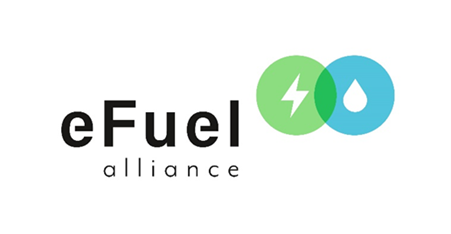We are committed to developing technologies, products and businesses that meet the demands of society, with the aim of co-creating and providing new value to help solve social issues.
Solid oxide fuel cells (SOFCs) are expected to be one of the cleanest energy sources because of their efficiency in high-power generation and effective reduction of carbon dioxide and other greenhouse gases compared to other fuel cells. Niterra is promoting the development of stacks that generate electricity from SOFCs, with the major business theme of contributing to the building of a future hydrogen society.
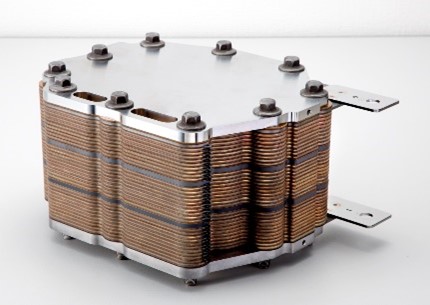
In recent years, as the percentage of renewable energy in society increases, further curtailment of surplus power output is expected to increase, making using surplus power a social issue.
One solution to this problem is to convert surplus electricity into hydrogen, store it, and use the stored hydrogen to generate electricity in the event of power shortages or power outages during disasters. To address this issue, we have applied our fuel cell technology to develop a "reversible SOC system" that enables hydrogen production through steam electrolysis and power generation through a fuel cell with a single cell stack.
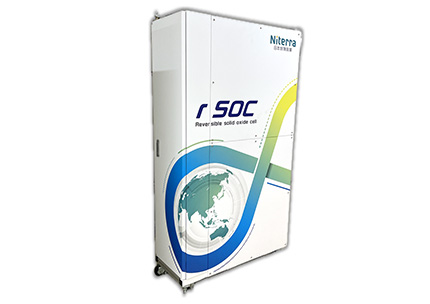
Piezoelectric ceramics are widely used in the devices for our daily use, but there are concerns that the presence of lead may have a negative impact on the environment and our health. We have developed lead-free piezoelectric ceramics, aiming to promote them for the replacement of current piezoelectric ceramics.
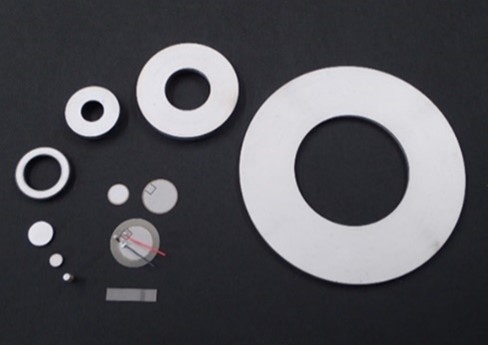
In the era of the Internet of Things (IoT), where various things are connected organically through the Internet, sensing technology is playing an increasingly important role.
By combining our wide range of sensing technologies with the IoT, we help improve business efficiency through automation, optimization, and generalization.
<Water quality sensing>
We are working to supply a comprehensive solution for land-based aquaculture that facilitates the management of aquacultural work by applying sensing technologies, visualizing water quality data, integrating it with camera-based biological information, and implementing big-data analysis.
We are working to supply a comprehensive solution for land-based aquaculture that facilitates the management of aquacultural work by applying sensing technologies, visualizing water quality data, integrating it with camera-based biological information, and implementing big-data analysis.
In order to contribute to the realization of a carbon-neutral society, we are developing methanation-related technologies (hydrogen production technology that applies ceramic solid electrolytes and CO2 recovery technology that applies oxygen concentrator technology).
<Regional CCU (Carbon dioxide Capture Utilization)>
We are developing technologies that can contribute to the prevention of global warming by recovering CO2 emitted from factories and commercial facilities and using it as a resource.
CO2, hydrogen, methane gas, and electricity are interchanged and circulated locally by optimally managing CO2 emissions/demand and renewable electricity production centered on CCU (Carbon Capture and Utilization).
We will connect a prosperous society aiming for virtually zero CO2 emissions to the next generation and contribute to the realization of a carbon-neutral society that takes advantage of regional characteristics.

The Group is advancing the creation of new businesses focusing on "Smart Health," "Decentralized Utility," and "Smart Mobility" as one of the measures to realize this vision.
In order to accelerate the creation of new businesses in these areas, the Group established a fund based in Silicon Valley, USA in 2021, based on the idea that it is necessary to collaborate with venture companies with cutting-edge technologies, business models, and ideas.
In 2024, Niterra established a corporate venture capital (CVC) fund with Global Brain Corporation. With the fund, we will support startup industries related to hydrogen and circular carbon.
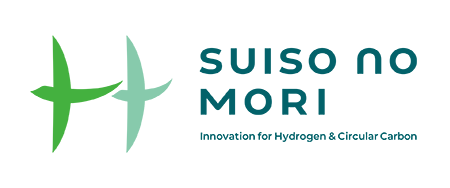
2In 2022, we established the "Niterra-AIST Carbon Neutral Advanced Inorganic Materials Cooperative Research Laboratory" within the AIST Materials and Chemistry. In the fields of "environment and energy" and "mobility," we will promote the development of advanced materials related to carbon neutrality by combining Niterra's inorganic materials and powder metallurgy technologies with AIST's cutting-edge functional materials development technologies, catalyst development technologies, and DX materials development technologies. We will continue to develop advanced carbon neutral materials.
2In 2024, Niterra and Tohoku University established the "Niterra x Tohoku Univ. MIRAI no ME Co-creation Research Center" to promote and oversee joint research aimed at the creation of innovative next-generation ceramics.
Together with the knowledge of ceramics, which is one of our strengths, we will accelerate the early proposal and social implementation of new ceramics that contribute to solving social issues.
In order to grasp the demands of society, we participate in various organizations and projects to search and investigate new themes that contribute to help solve social issues.
The Hydrogen Council is a global CEO-level advisory body with a long-term vision for the key role of hydrogen technology in the energy transition. We are participating as a supporting member.
MATSURI is a corporate collaboration project that promotes the realization of carbon neutrality through the production of algae utilizing photosynthesis. Various companies from a wide variety of industries participate in this project. Partner companies are developing businesses in all roles from algae production to sales, including the development of equipment related to algae cultivation, the maintenance of logistics networks, and the development and sale of products, and are working together to build an algae industry.
The eFuel Alliance is an organization whose goal is to establish and disseminate e-fuel, which contributes to the prevention of global warming, and to make it accepted all over the world.
* e-fuel: Fuels produced by synthesizing carbon dioxide (CO2) and hydrogen (H2) are called synthetic fuels. Of these, synthetic fuels that use hydrogen derived from renewable energy sources are called "e-fuel". Since CO2 in the atmosphere is used as raw material, burning e-fuel does not increase the amount of CO2 in the atmosphere.
